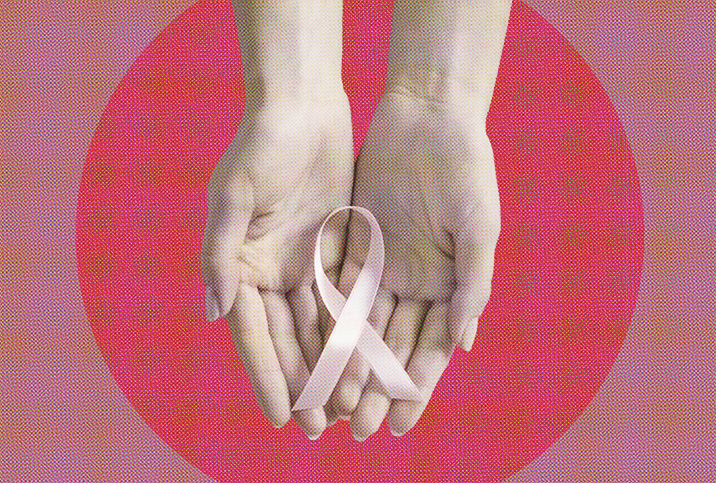Women With Metastatic Breast Cancer Deserve Awareness Campaigns, Too

A cancer diagnosis, of any stage, is devastating news. Not only do you discover your body is turning against you, but you now have endless decisions to make about who to tell, what doctors to visit, what treatment is right for you—and so on and so on.
With metastatic breast cancer, or stage IV cancer, you're faced with the additional burden of knowing that your battle is an uphill one.
Metastatic breast cancer occurs when breast cancer cells spread from the original cancer site and grow in other areas of the body. This can happen months or even years after the original diagnosis.
While rhetoric around breast cancer (think pink ribbons) is prevalent, there are not a lot of open, honest conversations about the realities of metastatic breast cancer, leaving women to suffer alone.
"One in 3 women will live with stage IV metastatic cancer until they die," said Dana Donofree, founder and CEO of AnaOno, "and we don't talk about it because we're scared to talk about it."
The problem with breast cancer awareness campaigns
When breast cancer metastasizes, the resulting tumors are made of breast cancer cells and can occur in one or multiple locations, such as the bones, brain, liver or lungs. The five-year survival rate for metastatic breast cancer is about 28 percent (meaning 28 out of 100 women will be alive five years after diagnosis).
While those numbers are daunting, the latest treatments can extend the life of patients with metastasis and help to improve their daily quality of life.
The best thing we can do to support women suffering from metastatic breast cancer is to spread this information and talk about what it means to have stage IV cancer—something that many breast cancer awareness campaigns fail to do.
Women with metastatic breast cancer need specific support. What are their treatment options? What does end-of-life care look like?
Metastatic breast cancer occurs when breast cancer cells spread from the original cancer site and grow in other areas of the body.
As a result of this oversight, some breast cancer patients with metastasis feel excluded by Breast Cancer Awareness Month.
This concern is something Jean Sachs, chief executive officer for Living Beyond Breast Cancer, highlighted in our interview. Sachs feels if more women understood the facts about breast cancer, and felt informed on what stage IV cancer really looks like, patients could focus more on pursuing treatment and improving their quality of life.
A big part of that weight is the feeling of being alone in the fight. It's crucial breast cancer awareness campaigns include women with stage IV cancer, letting them know they also have support and a community to turn to.
Treating metastatic breast cancer
Once the cancer has metastasized, there are important decisions to make about your future. In this circumstance, the best treatment guidance should come from your doctor, not your friend who knows someone in this situation, and definitely not from an internet search.
Your doctor has the experience and ability to recommend a treatment plan with an optimal outcome. Still, there may be some choices you'll have to make.
"When making choices about treatment, people need to weigh risk versus benefit, but it's common to experience the gamut of emotion," said Tibby Reas Hinderlie, communications manager for Breast Cancer Action. "Each of us moves through challenges and disorientation at our own pace."
'No matter how supportive your loved ones might be, it can always be helpful to talk to doctors, social workers and other cancer patients who can help with this.'
It's natural to walk away from a diagnosis and need time to process this information—and it's also natural to struggle with processing the news. You may feel empty, void of emotion or be potentially in shock. In the weeks following your diagnosis, you may wish to seek out the support of a mental health professional and/or a breast cancer support group.
"No matter how supportive your loved ones might be," Sachs said, "it can always be helpful to talk to doctors, social workers and other cancer patients who can help with this."
It's important to remember metastatic cancer doesn't necessarily mean death, because there are many effective treatment options that can extend your life:
- Chemotherapy: You may go through another round of chemotherapy to keep your cancer from continuing to spread. The type and length of therapy can vary from patient to patient.
- Radiation therapy: In some circumstances, your doctor may recommend radiation to target specific tumors that can be reduced to help make you comfortable.
- Targeted and hormonal therapies: These therapies focus on the progression of the cancer and help to slow the growth of your tumors. Depending on your circumstances, these treatments can target specific proteins on cancer cells that may be intensifying or speeding up the progression of your cancer.
- Surgical options: Your doctor may recommend surgical intervention to stabilize areas where the bones have been compromised by metastasis (fractures, vertebral compression causing pain or impinging on nerves, etc.).
- Therapeutic treatments: Your comfort is just as important as your treatment. Many patients benefit from holistic interventions, such as massage therapy, acupuncture, meditation, yoga and talk therapy, to cope with the physical and mental effects of metastatic breast cancer.
Regardless of your treatment plan, maintaining your mental and physical health can help you to cope. Working with a dietician and physical therapist can keep you active and healthy no matter your treatment. Many women with metastatic breast cancer continue to live meaningful, healthy lives, but it's important to plan for the future.
Planning for the future
A cancer diagnosis forces us to face a natural fear of death head-on. For many patients, "the first half of treatment is about the fear of what the treatment will do," Sachs explained, "but about halfway through, the treatment builds up, we get a lot of fatigue, and this is where many patients can wonder how they will get to the other side."
For patients with metastatic breast cancer, that fatigue is deepened by the possibility of end-of-life care.
"A third of us know we aren't surviving…and that's a huge number," Donofree said. "So, we're selling a false story [of survival] into the public, so maybe women aren't afraid to call their doctors, but they need to know to call the doctor."
For many patients, the thought of losing this battle is a reality, and while thinking about your death can feel depressing, planning for the end can also be reassuring. You have the opportunity to plan for pain management and to prepare your family for what's to come. In these instances, you are in control of the plan, and while your family will likely have an opinion about when to stop treatment, you need to do what feels right for you.
Education alleviates fear
The biggest hurdle when coping with metastatic breast cancer can often be planning for the future. And that can be difficult when most of the information widely available is not specific to the realities of stage IV cancer.
"We really encourage our patients to not do a lot of searching [online]…because the information you find is general and does not pertain to you," Sachs advised. "Instead, we encourage our patients to talk to their doctors to find out what treatments and what plan works best for you."

















